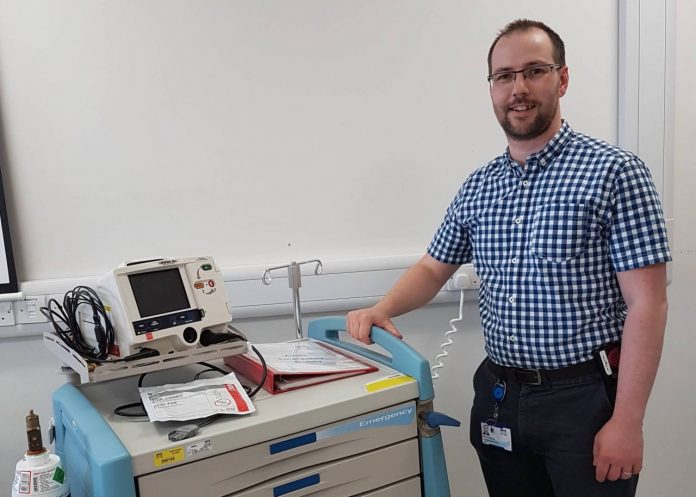Dave Williams is the new Lead Resuscitation Officer at NHS Forth Valley, bringing with him a wealth of experience from his previous roles as a Critical Cardiac Nurse and Resuscitation Officer at two large teaching hospitals in Yorkshire, as well as his lengthy clinical service within a voluntary aid organisation.
Here Dave explains his role, and his hopes for increased training in life-saving skills.
What does a Resuscitation Officer do?
Resuscitation Officers are a valuable clinical and educational resource. Yes, we teach vital CPR in the classroom, but we are also involved in debriefing incidents, reviewing standards to produce new policies and undertaking in-situ simulation to test capabilities. One of our major roles is to help improve patient safety and reduce avoidable deaths.
Having been involved in work to reduce avoidable 2222 calls as part of the Deteriorating Patient faculty in Leeds, the Quality Improvement work that is taking place here at Forth Valley is familiar territory. Emergency teams will always be needed within hospitals, but the frequency of avoidable cardiac arrest calls can be reduced greatly through awareness and education.
‘High quality CPR’ or ‘Basic Life Support’?
In my previous job, the term ‘Basic Life Support’ was discouraged as it risked trivialising this vital skill.
High quality CPR is fundamental in the treatment of all cardiac arrests and we are emphasising that through the training here in Forth Valley.
I would like all staff, not just those in a clinical role, to be empowered to know how to help in an emergency, and would like to see a culture change in how mandatory training is sometimes viewed within healthcare organisations.
I don’t see CPR training as a tick box exercise to be completed annually, but view it as an opportunity to develop fundamental knowledge, skills and confidence that can make a real difference for the patient. Within a hospital, as people are more likely to come across a victim of a cardiac arrest than a fire, it is important for resuscitation education and training to also be given a high priority. It would be great if legislation ensured the defibrillators were as widely available as fire extinguishers, so they can be deployed quickly to increase the likelihood of survival from cardiac arrest.
Evidence shows that high quality CPR increases the chance of survival and this is a concurrent theme throughout all the training we deliver.
What advances have you made since arriving in post?
I have already increased the availability of in-house training and am looking to invest in new manikins that provide performance-monitoring and real-time feedback to the user, thus enhancing practical learning and bringing a focus back onto the fundamentals of life support.
Further improvements are also in the pipeline following a review of the equipment and checklist documentation on the Emergency Trolley to ensure we are fully on board with the 2015 Resuscitation Guideline updates.
So what’s new in in-house training?
A wider range of resuscitation courses are now available to book via LearnPro, including paediatric resuscitation.
To deliver Resuscitation Council (UK) Courses such as ALS, the team require great support from instructors who often use valuable study leave or volunteer in their own time to be a faculty member. If you have recently joined NHS Forth Valley and are an existing Resuscitation Council (UK) Instructor please contact the Resuscitation training team.
For further information about resuscitation training or equipment.
Email: FV-UHB.Resuscitation-training@nhs.net
Website: https://nhsforthvalley.com/health-services/az-of-services/resus-training/







